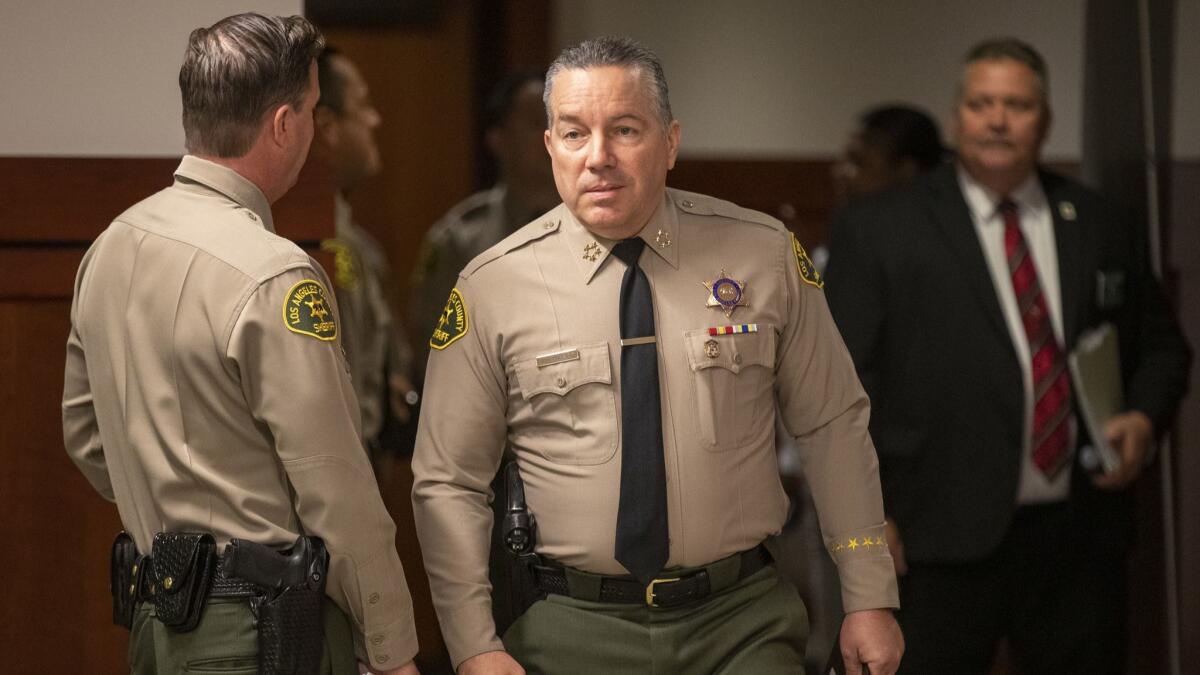Villanueva’s moves draw concern from some cities that pay for L.A. Sheriff’s patrols

Los Angeles County Sheriff Alex Villanueva runs the nation’s largest jail system and patrols 4,000 square miles of the country’s most populous county.
He’s also head of the police force for dozens of individual cities throughout the county that contract with his agency for law enforcement services. The cities collectively paid $310 million to the Sheriff’s Department this past year and have long been seen as a key source of political power.
But as Villanueva faces a crisis over his decision to hire back troubled deputies and his challenging of some policing reforms, he is getting pushback from some city leaders.
They are worried their liability costs could swell under Villanueva, who has criticized previous jail violence reforms and has reinstated deputies who were fired for unreasonable force, dishonesty and domestic violence.
The concerns add to the political pressure on the new sheriff, whose moves have been questioned in the months since his underdog campaign defeated incumbent Jim McDonnell last fall.
Villanueva insisted last month that the contract cities “couldn’t care less” about the turmoil between him and the county Board of Supervisors, which has sued over his decision to reinstate a troubled deputy.
But in a letter in response, the cities’ membership organization said the sheriff’s comment about the contract cities was “inaccurate and highly troubling.” The letter also cited The Times’ reporting about Villanueva’s feud with the Board of Supervisors.
“There is significant risk associated with reinstating deputies who have a history of excessive force or other misconduct and were previously dismissed in accordance with long-established department policy, particularly if those deputies are ever assigned to a contract city,” said the letter, signed by the leaders of the California Contract Cities Assn.
Marcel Rodarte, the association’s executive director, said the letter was spurred by hearing complaints from a significant number of member cities. He declined to name them, saying they preferred to advocate through the organization.
Villanueva, speaking at a Times editorial board meeting Tuesday, said he’s received positive feedback at recent community meetings in Lancaster, Palmdale, Carson and Norwalk. He said leaders of some of those cities are “tickled to death” by the department’s performance. Indeed, some city leaders interviewed by The Times backed Villanueva’s leadership.
“Their deputies are really happy,” Villanueva said. “They’re excited about how they’re going to figure out how to reduce crime rate, how they’re going to figure out how to get gang violence down, how we’re going to get guns off the streets successfully.”
For the 42 cities in Los Angeles County that don’t have their own police departments, paying for deputy sheriffs to patrol their streets is sometimes their biggest expense. Some cities spend as much as a third of their budgets on it. The payments represent about 10% of the department’s $3-billion annual budget.
The cities also pay for litigation stemming from shootings, car crashes and misconduct involving deputies at their stations — costs that have been rising in recent years and are poised to increase again in July.
“Mayors do care about increases to their liability,” said Curtis Morris, the longtime mayor of San Dimas, a city of 34,000 that has a $6.7-million annual contract with the Sheriff’s Department. Of that amount, about $600,000 automatically goes to the Los Angeles County Contract Cities Liability Trust Fund, which pools money from the contract cities to cover payouts tied to lawsuits as well as excess insurance.
Morris said if a deputy fired for using excessive force were reinstated, and then committed excessive force a second time, the person who suffered the deputy’s force could receive a larger settlement in a lawsuit by pointing out the deputy’s previous misconduct.
But Morris — who also serves as a member of the Contract Cities Liability Trust Fund Claims Board, which approves payouts tied to cases involving the contract cities — noted that the risk to contract cities isn’t just tied to individual deputies.
Insurers could raise the cities’ rates by deciding that deputies pose a greater risk of misconduct and are likely to attract large jury awards, he said. The Contract Cities Liability Trust Fund is partially self-insured and is also covered by excess insurance.
Because it is so difficult to find domestic insurers who cover high-risk policing activities, the cities have to buy some of the excess coverage from carriers that include Lloyd’s of London — an arrangement that requires yearly travel to England in order to maintain the relationships.
“It’s hard to get the insurance. These trips to London are sort of begging and saying, ‘We are trying to do all of these things [to mitigate risk],’ ” Morris said. “The comments being made by the sheriff make a lot of people say, ‘Will he continue the reforms?’ … It’s the uncertainty that’s created, and uncertainty to people who are underwriting risk is a red flag.”
Morris said he’s pleased with the day-to-day work of the Sheriff’s Department and strongly supports his local captain and deputies. But he’s concerned about any increases to the contract, which is his city’s largest expense.
In 2010, the cities paid a 4% surcharge — on top of the cost of their contracts — to the Contract Cities Liability Trust Fund. The liability surcharge for all the contract cities is now 10.5%, and it will increase to 11% in July because of the need to replenish the fund, which has paid out large jury verdicts and settlements from claims over the past several years.
In the fiscal year ending in 2014, the contract cities collectively paid $11.1 million in litigation stemming primarily from allegations of deputy misconduct, according to county data. That number spiked to $18.8 million in 2016 and dipped to $15.4 million last year.
Insurers also have been charging higher premiums for the same or smaller amounts of coverage than in years past, said Jonathan Shull, chief executive of the California Joint Powers Insurance Authority, which helps manage some aspects of the trust fund, including buying the insurance.
John Heilman, a West Hollywood City Council member, also praised his neighborhood deputies but said he’s troubled by the sheriff’s recent reinstatements of troubled deputies. With an $18-million contract, West Hollywood is among the highest-paying customers of the Sheriff’s Department because of its high volume of tourists and shoppers, which requires more patrols.
“When the sheriff is rehiring people who have problems in their past, that’s not good for the department. It’s not good for the community either,” he said. “As city officials, where we contract with the sheriff, we all share the liability. It is a concern for me if people are being brought back on who have engaged in conduct that is not consistent with high ethical standards.”
Heilman, who has served on the city council for three decades, acknowledged that the nature of police work means some liability is to be expected. In 2016, the city paid $7.5 million after deputies in West Hollywood mistakenly shot two hostages who were fleeing from a man who’d stabbed one of them at an apartment complex.
Villanueva, in a statement, said he understands the cities’ concerns but stressed that most of the deputies he reinstated were brought back because of decisions by the Civil Service Commission or because administrative investigations were not completed in the mandated time frame, which resulted in required reinstatements.
“This department would never take any action that would jeopardize our communities,” Villanueva said.
“I am fully aware of our obligation to minimize any civil liability and routinely examine any action, policy or training we implement to achieve that ultimate goal.”
Villanueva has repeatedly defended his rehiring of Caren Carl Mandoyan, a deputy who was fired in 2016 for violating policies regarding domestic abuse and dishonesty and who volunteered on Villanueva’s campaign. The sheriff has said Mandoyan was a victim of a punitive previous administration that relied on faulty evidence.
The Civil Service Commission upheld Mandoyan’s firing, but he was returned to duty as a result of a settlement agreement with the department. A court could decide in June whether the sheriff overstepped his authority in the Mandoyan matter, as the supervisors contend.
The Times reported last month that another deputy, Michael Courtial, was reinstated in February after being fired for using unreasonable force. While his appeal before the county Civil Service Commission was pending, Courtial entered into a settlement agreement with the department that gave him his job back. The department has said 14 similar reinstatements occurred under McDonnell.
On the campaign trail, Villanueva often spoke of his desire to reduce county liability by treating deputies more fairly. At a forum hosted by the American Civil Liberties Union of Southern California in September, a woman asked Villanueva how he would reduce the amount that taxpayers pay in lawsuits involving deputies.
“I have about 450 deputies who were fired under McDonnell, of which 300 approximately are deemed to be unlawful terminations. That is going to be 300 lawsuits, and each lawsuit is going to be a six-figure cost,” Villanueva responded. “Legal cost avoidance is a major issue in managing a department of this size and managing it well.”
Villanueva’s answer, however, did not address the price of lawsuits because of shootings by deputies, uses of force, automobile crashes or deputy misconduct. Those costs are consistently more expensive than employment-related liability expenses, said Steven NyBlom, manager of the county’s risk management branch.
Last year, the county paid $40 million tied to third-party cases related to deputy actions including shootings, force, vehicle incidents and wrongdoing, according to county data. Employment cases, including disputes over personnel decisions, discrimination and harassment, resulted in $7 million in payouts.
Some mayors of contract cities said they are generally pleased with Villanueva, noting that he has allowed for city leaders to have a more influential voice in selecting their station captains.
Lancaster Mayor R. Rex Parris, whose city has the most expensive Sheriff’s Department contract, worth $26 million a year, said he’s not worried about the deputy reinstatements. Parris said a bigger concern for his city is that understaffing has caused deputies to work long shifts, sometimes stretching to 16 hours, which is unsafe.
That problem has led the city to begin creating a parallel public safety agency that would employ officers to handle low-level calls so that deputies can focus on bigger cases in order to reduce crime.
“I really don’t care about how the sheriff manages individual personnel decisions,” Parris said. “I care about whether the people in Lancaster are safer.”
Other mayors — including Albert Robles of Carson, Marsha McLean of Santa Clarita and Brent Tercero of Pico Rivera — said they had strong relationships with the Sheriff’s Department and did not share concerns about Villanueva’s moves. Those cities are some of the largest served by deputies.
“Villanueva has only been sheriff less than six months and already he has met with me, the entire city council and our residents, and that is indicative of his responsiveness to our city, and we appreciate that,” said Robles, noting that the sheriff recently spoke at a town hall in Carson.
Still, some mayors say they wouldn’t want a deputy with a blemished record to patrol their streets.
“Not in our city,” said Cerritos Mayor Naresh Solanki. “We would have a huge concern if that deputy came to patrol our city.”
Twitter: @mayalau
More to Read
Sign up for Essential California
The most important California stories and recommendations in your inbox every morning.
You may occasionally receive promotional content from the Los Angeles Times.












